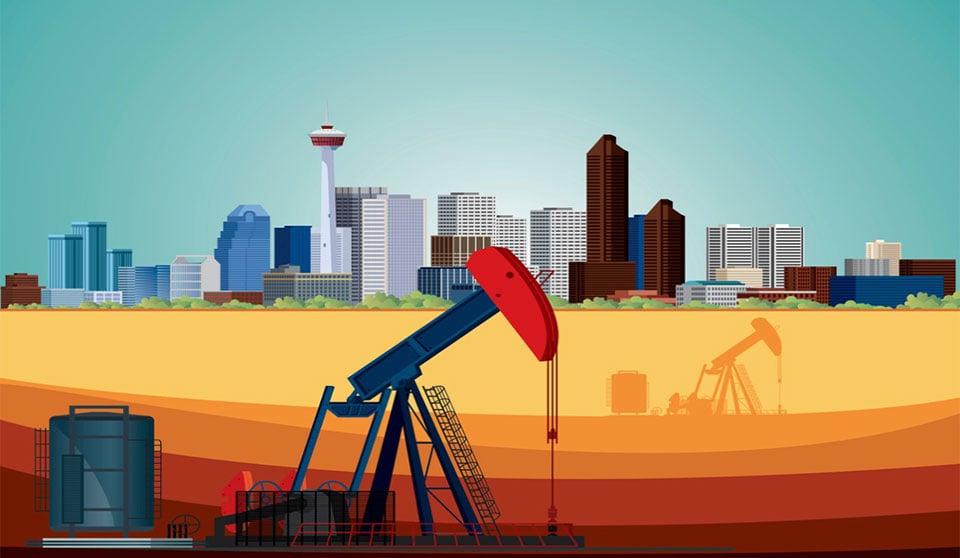Hey, Wexiteers, says Tony Wilson, the border starts at Banff!

Since the recent federal election I’ve been thinking a lot about young children who have temper tantrums because they aren’t getting their own way. The post-election hysteria about Western separatism (and even civil war!) reminds me of eight-year-old boys who don’t win at Monopoly, and throw all their pieces around the room in anger as they storm away in tears.
It’s remarkable that the current vitriol is directed so much at the federal Liberals (and Mr. Trudeau in particular), blaming them for an oil price of $35 a barrel for Western Canada Select when that’s the price the American market has set for Alberta oil. The venom is also directed at the Liberals for their failure to build the Trans Mountain Pipeline expansion, even though the project’s glacially slow review and approval process was largely put in place by the Stephen Harper Conservatives.
The federal government under the Liberals spent $4.5 billion to buy the existing pipeline from Kinder Morgan Canada Limited, and it is committed to pay another $7.4 billion to expand it. Once finished, Alberta oil will be shipped by tankers from Burnaby to Asian markets where it’s expected to fetch a higher price than what the American market will currently pay.
The bile seems misdirected considering the numerous legal delays — almost like a backfiring car accidentally starting a marathon. You see, if Albertans should be angry at anyone in Canada about legal roadblocks to the pipeline’s expansion, it shouldn’t be the federal government. They should be blaming British Columbia and its champagne socialists — the B.C. NDP, the Greens, and the mayors of Vancouver and Burnaby — who have attempted to use every tool in the toolbox to stop the pipeline expansion’s construction and the shipment of Alberta oil to Asia through Burrard Inlet.
Albertans legitimately roll their eyes over the hypocrisy concerning fossil fuel use in B.C., particularly as they watch news reports showing Vancouverites driving their gasoline-burning cars to work, local activists driving to anti-pipeline rallies and flying to environmental conferences.
The results of the election, and the legal and administrative delays to the pipeline’s completion, are leading some Albertans to declare themselves separatists under the banner of “Wexit.” There have been rallies, attended almost exclusively by white males wearing baseball caps emblazoned with “Make Alberta Great Again.” There are billboards calling for independence from Canada, with one even accusing Prime Minister Trudeau of leading Canada into civil war. And with no irony whatsoever, the Wexiteers have applied for a Canadian trademark and are marketing their MAGA hats featuring the Canadian national emblem: the maple leaf.
There’s a social media firestorm of people advocating Wexit, although a recent Vancouver Sun article suggested that the Russian government and its bots are actively engaged in promoting Wexit on social media to disrupt Canadian politics. As with the Brexit referendum and the last U.S. federal election, Russian intelligence, it seems, is always on the lookout for useful idiots, and the Wexiteers may unknowingly fit the bill.
From my perspective in Vancouver, Wexit’s leadership seems to be, shall I say, a few French fries short of a Happy Meal. It has been reported by Vice that the Wexiteers are led by right-wing and anti-Muslim conspiracy theorists who have accused Trudeau’s government of “normalizing pedophilia,” tolerating ISIS terrorists penetrating the country, and pursuing an immigration policy aimed to “depopulate the white Anglo-Saxon race.” Peter Downing, a key organizer for Wexit, is a former RCMP constable who ran in the 2015 federal election for the anti-abortion, pro-gun Christian Heritage Party, whose campaign platform included assertions that CO2 was a beneficial natural gas and not a cause of climate change, that the CBC should be defunded, and that the public education system should not teach “gender fluidity.”
Your vibe attracts your tribe, I guess.
So, with the apparent rise of Western separatism, let’s have a thought experiment to see what the consequences of Wexit might be, assuming a clear question is asked in a referendum and a clear majority votes in favour of it, as per the Reference re Secession of Quebec [1998] 2 SCR 217.
First of all, British Columbia won’t go along with Wexit. Sure, there may be a few supporters here and there, but remember, B.C. elected 11 federal Liberals in the 2019 election, most of them from the very multicultural Metro Vancouver where we just don’t wear MAGA hats. Ever. So if Alberta decides to separate from Canada after a referendum, B.C. won’t be part of this new independent nation. B.C. will remain a part of Canada, and better yet might get to extend its borders to include Canada’s national parks in Alberta.
Second, Alberta is landlocked, like Bolivia. And although some have compared Alberta to Switzerland in arguing that landlocked countries can also be rich, Switzerland is rich because it has money and Alberta is poor if it doesn’t have a port to ship its oil and other natural resources from. Alberta’s economy may resemble landlocked Bolivia’s, which is beholden to neighbouring Chile for an open water port. And the United Nations Convention on the Law of the Sea can’t force a state with a marine coastline to allow shipments of products from neighbouring landlocked states. It just requires “negotiation.” So B.C. could keep Alberta oil landlocked for a long time, if it wanted, until a suitable fee was negotiated.
Third, does anyone really think that the First Nations in Alberta are going to vote in unison with a bunch of middle-aged white men wearing MAGA hats who complain about Ottawa, Trudeau and foreigners? Alberta First Nations may be justifiably angry at Ottawa for a lot of things, but they aren’t going to give up on Canada and leave their economic fate to the Wexiteers.
Fourth: Face it, new Canadians in Alberta are as likely to support Wexit as they are to sign a petition demanding Don Cherry’s reinstatement as host of Coach’s Corner. But if Alberta did separate, would new Canadians feel at home in this new country of Wexiteers, or will Alberta no longer be perceived as a welcoming place to work and raise their families? Alberta could experience a people drain to B.C. and other provinces.
Fifth: Assuming that Alberta would need to negotiate with Canada about assuming its share of federal debt (and assets) before separating, how would Alberta pay that when oil is $35 a barrel?
Sixth: What will elderly Albertans on old-age pensions do? Oil has always been a boom-and-bust commodity, and right now it’s in the “bust“ cycle. So how will an independent Alberta pay for its social programs, particularly the ones it will have to take over from the federal government and that are targeted to the elderly? A sales tax perhaps? (That’ll go over well).
Clearly this is a thought experiment, but when I raised these questions with an Albertan colleague over a beer, she joked, “Well, then, I guess we can always join the United States!” But would they? Without a constitutional amendment to allow Alberta to become a U.S. state, Alberta would have the political status of Puerto Rico within the great republic to the south, with far less power, influence and clout at the table than they do as a Canadian province. Remember, Alberta’s population numbers only 4.4 million, and when you figure out how many of those are voters, that’s not a lot of votes. Or power. Or influence.
With significant control over its resources and more constitutional powers as a province in Canada than as a state in the U.S., why would Alberta want to give that up and, in the process, be outnumbered by 322 million Americans? (Mind you, if Alberta were to become a U.S. protectorate or state it would be a great place for the Americans to build new silos for their Moscow-bound nuclear missiles. It’s so much closer to Russia than Colorado. So maybe some Americans are surreptitiously supporting Wexit, now that Greenland is not for sale.)
Wexit will go nowhere. What should happen, however, is a debate on equalization and other federal transfers. It is unfair that the current system effectively transfers more money out of Alberta than into it, particularly now, when the price of oil is so low. Alberta has overcontributed to Canada’s high standard of living for generations, effectively subsidizing the poorer provinces (including Québec, which has benefited from Alberta's wealth but rejects its oil).
Equalization reform should come, but in the short term it's been suggested that the Fiscal Stabilization Program should bolster payments to Alberta to deal with the downturn in oil prices.
But the best way to douse that Alberta separation fire is to get that damned Trans Mountain Pipeline expansion finished!











